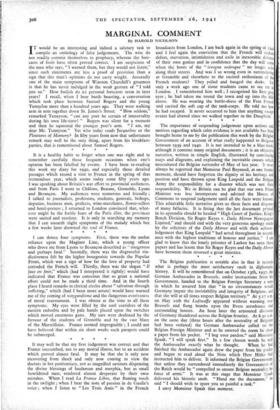The importance of suspending judgement upon actions and motives regarding
which calm evidence is not available has been brought home to me by the publication this week by the Belgian Government of an account of- what really happened to Belgium between 1939 and 1940. It is not intended to be a blue-book although it contains many original documents ; it is an objective narrative, written in simple English, illustrated by convincing maps and diagrams, and explaining the inevitable- causes which necessitated the Belgian surrender of May of last year. It must always be regretted that Monsieur Paul Reynaud, at one frantic moment, should have forgotten the dignity of his heritage and position and have thrown upon King Leopold and the Belgian Army the responsibility, for a disaster which was not their responsibility. We in Britain can be glad that: our own Prime Minister was less intemperate and advised the House of Commons to suspend judgement until all the facts were known. This admirable little narrative gives us these facts and disposes of many fallacies. It is fitting that the last document printed in its appendix should be headed " High Court of Justice, King's Bench Division, Sir Roger Keyes v. Daily Mirror Newspapers Lisnited," and should end with the very generous apology made by the solicitors of the Daily Mirror and with their acknow- ledgement that King Leopold " had acted throughout in accord- ance with the highest traditions of honour and justice:' I am glad to know that the lonely prisoner of Laeken has seen these papers and has learnt that Sir Roger Keyes and the Daily Mirror have between them reversed a great injustice.


























 Previous page
Previous page